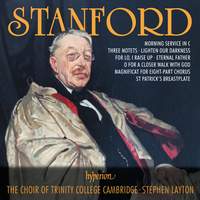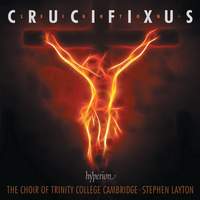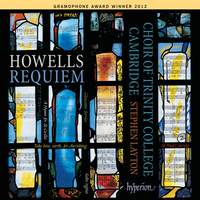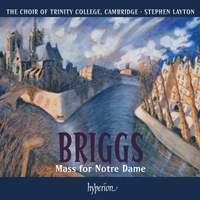Interview,
Stephen Layton on the choral works of Stanford
 The choir of Trinity College, Cambridge is one of the bastions of the Anglican choral tradition - adopting a different approach to the all-male choirs of King's and John's, with a mixed choir of undergraduates giving a correspondingly different (and equally unique) sound.
The choir of Trinity College, Cambridge is one of the bastions of the Anglican choral tradition - adopting a different approach to the all-male choirs of King's and John's, with a mixed choir of undergraduates giving a correspondingly different (and equally unique) sound.
The choir has numerous acclaimed recordings to its name; for their latest album, they've recorded a selection of choral works by Charles Villiers Stanford - some relatively rarely performed items interspersed with time-honoured staples of the repertoire.
Despite being in the midst of a hectic tour to Canada with the choir, Stephen Layton was kind enough to offer some thoughts on this album and the musical world in which Stanford lived and worked.
The introductory notes point out that Stanford was heavily influenced by his time studying in Germany, and it’s natural to expect this to come out in his composition. Do you think these choral works show the same level of Germanic influence as, say, his symphonies?
I think the answer to this is plainly, yes. One of the foremost original elements that Stanford brought to Anglican liturgical music was a new symphonic way of thinking. The miracle of this approach, however, was that he did it within the restrictive liturgical circumstances he was faced with. Service music and anthems were no longer the lengthy pieces of S S Wesley, Walmisley (famously of Trinity) or Stainer (at Magdalen during the 1860s). Instead, music had to be shorter and more concise. Stanford was able to write such music yet with a symphonic cohesion which he had learned from his Leipzig studies and from the example of Schumann, Sterndale Bennett, Joachim and especially Brahms. In the service music we see this particularly in the way various movements - the Te Deum, the Magnificat and Nunc dimittis are analogous with movements of the symphonies. Moreover, anthems such as 'Beati quorum via' reflect instrumental forms such as 'sonata'.
Reading between the lines – mentions of rather lowbrow organ recitals, a moribund choir and an implicitly low number of trebles – it seems that the Anglican musical landscape of Stanford’s time may have left a little to be desired. Is it accurate to view him as helping to revitalise things and raise standards?
Stanford inherited the initial innovations of John Larkin Hopkins at Trinity - an independent choir school and a renovated organ. Changes were very much afoot at St Paul's Cathedral with Stainer where, after more than half a century of rather shambolic and indisiplined choir singing there, things moved into a new gear. The choir was robed in cassocks and surplices, it processed into the pews, the singing was disciplined, there were weekly (yes, weekly) choir rehearsals, the choral vicars (who were pretty bolshy) were brought into line, and, perhaps most importantly, with money commuted from the Ecclesiastical Commissioners, the choir was expanded from 12 boys and 6 men to 36 boys and 18 men.
At Trinity Stanford seems to have taken a similar initiative. The choir steadily expanded to about 22-25 choristers and there were a reasonable group of lay clerks. Stanford also seems to have tried to recruit undergraduates as choral scholars, though this didn't become systematic for some time. Certainly Stanford had at least one purge of old tired voices in the 1880s. From the evidence of the music he wrote for the choir, and the music lists which survive at Trinity, the choir must have been quite good and his characteristic energy must have encouraged change and an upward standard. By the same token, with the renovated organ, the recitals during the Easter Term (from 1873) brought 'live' instrumental music to the university and were well attended. Much of the music at the beginning was arrangements of non-organ repertoire (common for the time), but by the end of the 1880s, as more and more guest organists were invited to give recitals, the repertoire increasingly consisted of original organ works.
Some of these works are well-known – For lo, I raise up is quite rightly a favourite among both lay-clerks and listeners, and the three Latin Motets equally so – but others such as Eternal Father and the beautiful Lighten our Darkness are much less often performed. Why do you think they’ve fallen by the wayside?
In the case of 'Eternal Father' it's difficult to say, except that it is more challenging than the Latin introits (as they were known) and a bit longer. 'Lighten our darkness' is a relative newcomer to the scene since it has not been in print that long and needs time to enter the repertoire. My impression is that this is happening.
Released at the end of June, the Choir's new album features favourites such as For lo, I raise up and O for a closer walk with God.
Available Formats: CD, MP3, FLAC, Hi-Res FLAC
Other recent releases from the choir of Trinity College with Stephen Layton
'The Trinity Choir responds to the music’s energetic, often muscly feel, and Stephen Layton’s direction declines to prettify.' (Choir & Organ)
Available Formats: CD, MP3, FLAC, Hi-Res FLAC
'A glorious celebration of Howells' sacred output...Gorgeously sung throughout, this is repertoire perfectly suited to Trinity Choir's pure, chorister-like sound.' (BBC)
Available Formats: CD, MP3, FLAC
'I can confidently say that this recording is one of the finest CDs of sacred choral and organ music you'll ever hear. I'm not ashamed to say I had tears in my eyes' (Gramophone)
Available Formats: CD, MP3, FLAC






